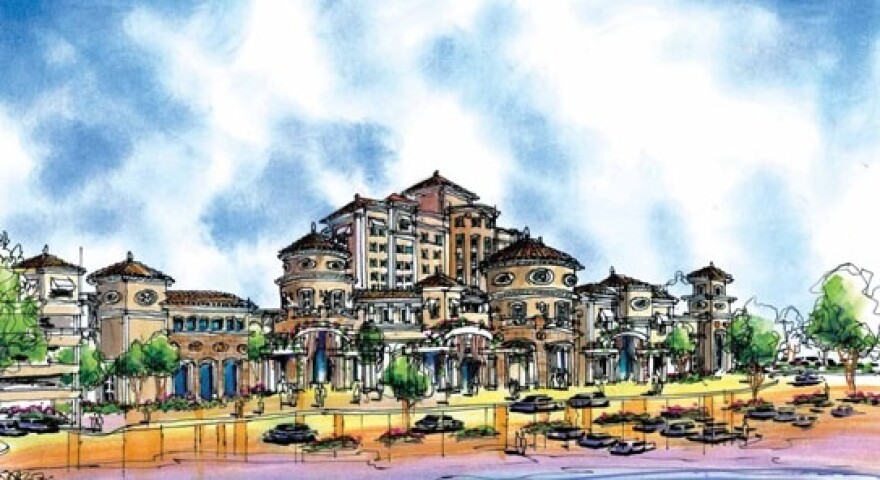In just a few weeks Proposition 48 will ask California voters to approve or reject a plan to build a new Indian casino on Highway 99 north of Madera. Members of the North Fork Rancheria say it’s a vital importance to the future of their tribe while critics, largely backed by other casinos, say it would set a dangerous precedent for what they call "reservation shopping." FM 89’s Diana Aguilera explains what this proposal means for the county and the city of Madera.
There's not much to see while driving along Highway 99 on the outskirts of Madera except some dry fields, a few gas stations and remote hotels.
But the North Fork Rancheria of Mono Indians hope to change the scenery. The tribe plans to build a large casino complex featuring as many as 2,000 slot machines on land it acquired next to the highway.
"We’ll start off with the casino, some restaurants, food court, bingo hall. We’ll go into parking garage and a hotel," said Maryann McGovran, vice chair of the tribe. "You’re going to see it, right here on the front 55 acres."
Forty five minutes away from the Casino site is the tribe's home in the quiet foothill community of North Fork south of Yosemite. McGovran claims they can't build a casino there because the tribe doesn't own land, with the exception of a handful of tribe members who own an 80-acre parcel.
"The casino issue is not just a local issue, it's a statewide issue." Cheryl Schmit, Stand Up for California
"Back in the 50's all the land was taken away and went to fee status which is where you pay property taxes," McGovran said. "So when we were re-recognized in the 80's the land went to those individuals that paid the taxes for all those years and not the rest of the tribe."
McGovran points out that’'s the reason why the tribe acquired the 305-acre Madera site back in 2011 after what they call a meticulous process with the U.S. Department of the Interior.

"They couldn’t deny us. They recognized that we had historical connection to this land. They recognized that there was a signed treaty that places us on this land and they recognize the fact that we are landless." McGovran said.
And in July of 2013 after governor Brown agreed to the project, the state’s legislature formally approved the casino complex on the acquired tribal land.
But right away critics of the proposed casino popped up.
"Here we have an off reservation casino that’s been approved to be on Highway 99," Cheryl Schmit said. "If this facility is allowed to move forward it sets a precedent for California."
She is the leader of Stand Up for California, a group that focuses on gambling issues and is leading the No on 48 campaign.
"The casino issue is not just a local issue it's a state wide issue," she said. "If this one goes through you will see another number of proposals."
Schmit says if the referendum is approved it will open the door for other tribes to build casinos off reservation and in urban areas. But tribal leaders disagree, saying acquiring new land requires passing a very strict process to win the approval of the federal government.
In just a few weeks, voters will be asked to make a choice on the future of the casino with Prop. 48. Those who want the casino project to move forward would cast a "yes" vote. And those who hope to block the project would vote "no".

These options have left local Madera officials taking sides.
"It’s positive, It’s one of the most important economically thing that’s come to Madera county for 50 years," said Tom Wheeler, chairman of the Madera County Board of Supervisors.
Wheeler claims the casino will bring much needed jobs and benefits to the area.
"The contract that the tribe has made with Madera County and the state of California I know it's the best in California and probably the best in the United States," Wheeler said. "It's almost 5 million dollars a year for the county, the city, our schools, the roads, the sheriff's."
The North Fork Mono say they've also negotiated payments into the state's revenue sharing fund for non-gaming tribes. The tribe says it will also share profits with a Humboldt County tribe.
But not everyone sees the casino complex as a good move, including Madera mayor Robert Poythress.
"The reason I’m opposing the North Fork casino, one reason primarily, and that’s due to issues of problem gambling that it would cause," he said.
For a region that already faces high unemployment rates, Poythress says the last thing residents need is a new casino.
"They just become addicting to gambling, just like any other addiction, it's something that would affect families, jobs, pocket books, the whole shot," Poythress said.
The campaign that wants to block the casino has raised more than $11 million this year. The two biggest donors are neighboring tribe Table Mountain Rancheria, who own a casino in Fresno County, and a Wall Street firm that backs the Chukchansi Gold Casino owned by a tribe in Coarsegold.
As local officials debate whether a new casino on Highway 99 is the right path for Madera County's success, California voters will get the chance to weigh in on prop 48 on the November Ballot.


